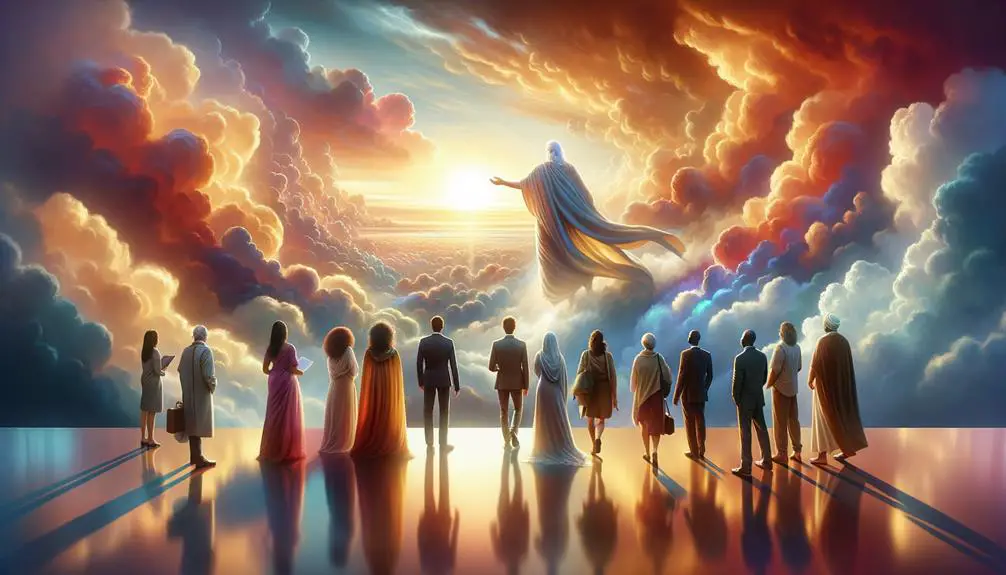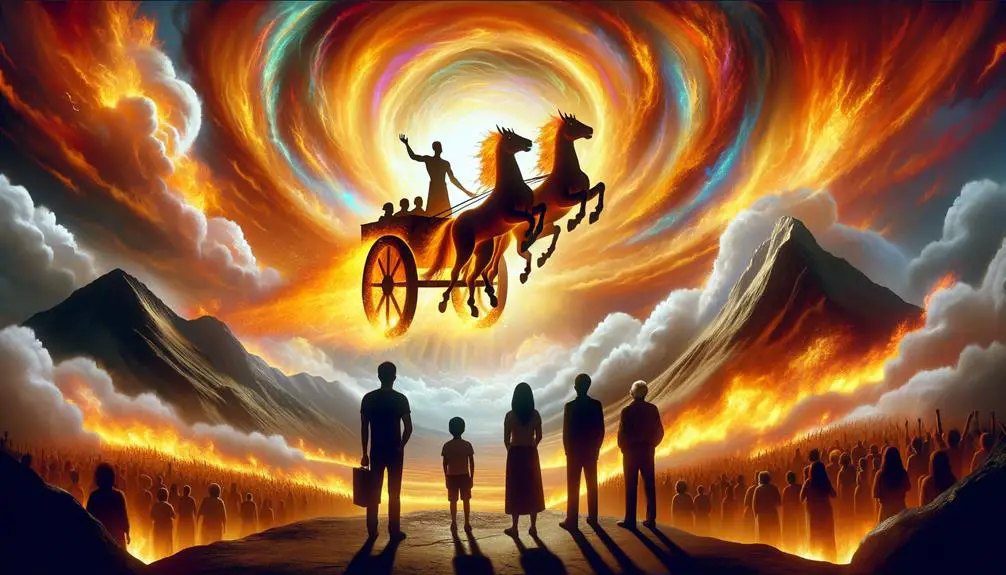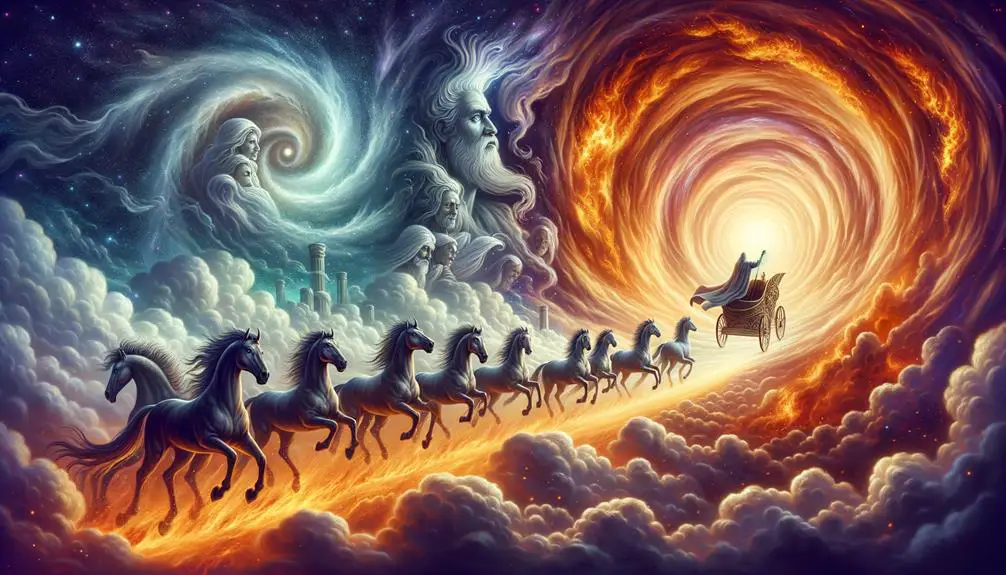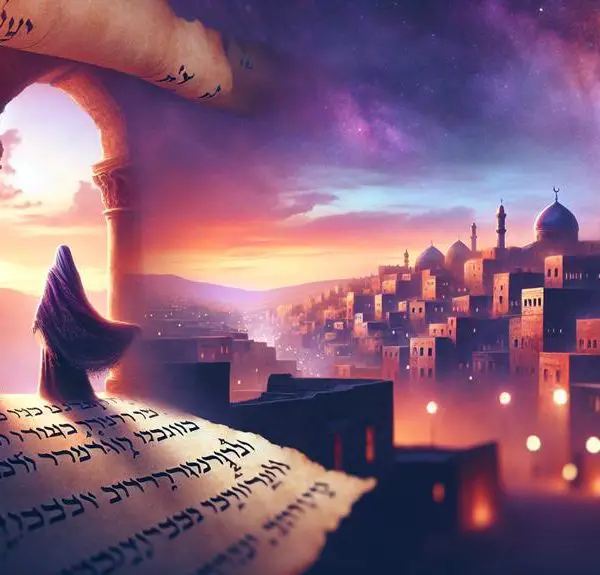Gain insight into the unique biblical figures who bypassed death, sparking curiosity about divine selection and eternal mysteries.

Who Didn't Die in the Bible
In the ancient texts, not everyone made their final bow in the traditional sense. You've likely heard tales of Enoch and Elijah, who skipped the mortal conclusion in favor of a more divine exit.
Their stories are among the few that challenge our understanding of life and death within the biblical narrative. As you ponder the implications of their unique departures, consider how these exceptions to the rule might reshape your views on the afterlife and the possibilities of divine intervention.
Isn't it intriguing to think about what set them apart in the eyes of the divine?
Key Takeaways
- Enoch and Elijah are notable for their departures from Earth without experiencing death, signifying divine favor.
- The lack of a detailed death account for Melchizedek hints at interpretations of him having an eternal priesthood.
- Elijah's ascension in a fiery chariot and Enoch's heavenly departure challenge conventional views on life and death.
- Moses' secret burial by God focuses on his spiritual legacy rather than his physical death, suggesting a unique departure.
Enoch's Heavenly Departure

Among the select few individuals in the Bible who didn't experience death in the conventional sense, Enoch's departure to heaven stands out as a unique and significant event. You'll find that Enoch's story, primarily recorded in the Book of Genesis, is shrouded in mystery and fascination due to its brevity and the profound implications it holds. His ascent to heaven without facing death underscores a pivotal moment in biblical narratives, emphasizing the possibility of divine favor transcending human mortality.
Enoch's teachings, though not extensively detailed in the canonical texts, have been the subject of much scholarly interest. Ancient translations of the Bible and other religious texts offer glimpses into his life, portraying him as a man of righteousness and intimate communion with God. You'll notice that these texts suggest Enoch's knowledge and wisdom were so profound that they merited a direct transition to the divine realm, bypassing the physicality of death. This aspect of his story not only enriches our understanding of biblical figures who were deemed exceptionally close to God but also invites a deeper exploration into the nature of such divine-human interactions.
Moreover, Enoch's influence extends beyond the narrative of his ascension. Ancient translations and apocryphal writings attributed to him have contributed significantly to Jewish and Christian eschatology, offering insights into early beliefs about the cosmos, angelology, and the final judgment. As you delve into these texts, you'll uncover a complex figure whose life and teachings continue to fascinate scholars and believers alike, serving as a bridge between the earthly and the divine.
Elijah's Fiery Ascension
You'll find Elijah's departure from Earth uniquely dramatic, as he ascends to heaven in a whirlwind, escorted by a chariot of fire. This event not only marks his physical exit but also signifies the continuation of his prophetic legacy through Elisha.
Analyzing this narrative, you uncover layers of theological implications, particularly regarding the nature of divine intervention and the transmission of prophetic authority.
Elijah's Heavenly Departure
In the narrative of Elijah's departure from the earth, the Bible describes a remarkable event where he's taken up into heaven in a chariot of fire, bypassing death altogether. This moment isn't only a testament to his prophetic mission but also underscores the unique relationship between God and his prophets.
The miraculous whirlwind symbolizes divine intervention and the transition between the earthly and the divine.
Elijah's ascension signifies his exceptional status among prophets.
The prophet's mantle, left behind, represents the transfer of prophetic authority.
This event challenges the conventional understanding of mortality and divine favor.
It serves as a powerful narrative on faith, obedience, and divine selection.
Analyzing this, you're invited to delve into a story where the boundaries of life and the afterlife blur, offering a profound theological reflection.
Chariot of Fire
Building on our understanding of Elijah's unique departure, let's explore the pivotal moment of the chariot of fire, a dramatic ascension that encapsulates the intersection of divine will and prophetic destiny. This event not only marks Elijah's transition but also serves as a critical juncture for interpreting divine phenomena.
Aspect |
Analysis |
|---|---|
Historical Accuracy |
Debated among scholars, seen as a symbolic act |
Modern Interpretations |
Views range from literal to metaphorical |
Divine Will |
Represents direct divine intervention |
Prophetic Destiny |
Signals Elijah's unique role and future impact |
Through this lens, one can appreciate the chariot of fire as both a literal and metaphorical expression of Elijah's significance, blending historical accuracy with modern interpretations. It's a testament to the enduring fascination with Elijah's story and its implications on faith and prophecy.
Prophetic Legacy Continues
Elijah's fiery ascension not only concludes his earthly journey but also heralds the continuation of his prophetic legacy, influencing generations to come. This spectacular event marks a pivotal moment in biblical history, where the mantle of divine inheritance is passed to Elisha, his successor. This transition underscores the importance of prophetic messages in guiding and shaping the spiritual direction of the people.
- The act represents a seamless transfer of divine authority.
- It emphasizes the enduring nature of God's communication through prophets.
- Elisha's receipt of Elijah's mantle symbolizes the continuation of divine guidance.
- This event highlights the interconnectedness of prophetic ministries.
- It serves as a testament to the lasting impact of prophetic messages on future generations.
The Mysterious Melchizedek
You encounter Melchizedek, a figure of significant intrigue, whose identity remains shrouded in mystery within the biblical narrative. His designation as a priest forever, without apparent beginning or end, challenges conventional understandings of priesthood and lineage.
The interaction between Melchizedek and Abraham introduces a pivotal moment, underscoring the complexity and depth of Melchizedek's role in scriptural texts.
Melchizedek's Enigmatic Identity
Among the most enigmatic figures in the Bible, Melchizedek's identity remains a subject of intense scholarly debate due to his unique role and mysterious origins. As King of Salem and a figure of seemingly divine origin, he captivates both theologians and historians alike.
- *Melchizedek is introduced without a lineage, contrasting typical biblical genealogies.*
- *His title as King of Salem suggests a connection to peace and righteousness.*
- *Mentions of divine origin hint at a supernatural aspect to his character.*
- *Scholars debate whether Melchizedek was a historical figure or a symbolic representation.*
- *His brief appearance in the Bible leaves many questions unanswered about his true nature and role.*
Analyzing Melchizedek's identity sheds light on the broader themes of priesthood and kingship in biblical texts.
Priesthood Without End
In the exploration of Melchizedek's enigmatic character, his designation as a priest forever stands as a pivotal aspect that challenges traditional views on priesthood in biblical texts. Unlike typical priests whose roles were often bound by lineage or temporal service, Melchizedek's priesthood suggests an eternal lineage, unanchored by genealogical or temporal limitations.
This concept of a priesthood without end not only elevates his status but also introduces the notion of divine succession that transcends human constraints. The biblical narrative, by presenting him without a recorded beginning or end, subtly underscores the uniqueness of his priestly role.
His eternal priesthood, thus, serves as a prototype for understanding divine succession, marking a departure from conventional priesthood models and enriching the tapestry of biblical theology with its depth and complexity.
Melchizedek and Abraham
Delving into the narrative of Genesis, we encounter Melchizedek's intriguing interaction with Abraham, a pivotal moment that further mystifies his character and deepens our understanding of his unique priestly role. This encounter highlights Melchizedek's kinghood and his connection to the Abrahamic covenant in several ways:
- Melchizedek, as king and priest, blesses Abraham, reinforcing his authority and divine favor.
- His blessing of Abraham implicitly ties Melchizedek to the Abrahamic covenant, suggesting a divine endorsement of this sacred agreement.
- Melchizedek's offering of bread and wine prefigures future sacramental practices, linking him to an eternal priesthood.
- His kinghood and priesthood underscore a dual role, serving both as a ruler and a spiritual mediator.
- This narrative enriches our understanding of the complex theological landscape of the Bible, emphasizing the interconnectedness of its figures.
Moses' Secret Burial
While the Bible recounts the demise of many significant figures, Moses' burial remains shrouded in mystery, as no one knows his exact final resting place. This enigmatic conclusion to Moses' life contrasts sharply with the detailed accounts of his leadership through the desert wanderings and the appointment of his successor Joshua. The circumstances surrounding his death and burial are unique, underscoring his special relationship with God and his unparalleled role in Israel's history.
Moses' death is mentioned in Deuteronomy 34, where it's stated that God Himself buried him in Moab, but no human knows his burial site. This secrecy has sparked much speculation and analysis among scholars and theologians.
Aspect |
Significance |
Implication |
|---|---|---|
Location Unknown |
Prevents idolatry |
Protects sanctity |
God as Burier |
Special relationship |
Unique distinction |
No Successor |
Irreplaceable leader |
Marks end of an era |
Mystery Preserved |
Encourages faith |
Focus on legacy, not relic |
These facets of Moses' secret burial not only highlight his singular importance in biblical narrative but also serve as a testament to the mysteries of faith that transcend human understanding. The absence of a known grave shifts the focus from the physical to the spiritual legacy of Moses, emphasizing the teachings and laws he imparted over the physicality of his existence. This approach ensures that Moses is remembered for his contributions to the covenant and moral foundations of the Israelites, rather than for any tangible monuments or sites.
The Translation of Elijah

Among the remarkable narratives of the Bible, Elijah's translation stands out as an extraordinary event, where he didn't experience death as mortals do, but was taken up to heaven in a whirlwind. This event not only signifies his importance as a prophet but also marks a pivotal moment in biblical history, showcasing the direct intervention of the divine in human affairs. Elijah's life was full of miraculous events and profound prophetic messages that have been analyzed and revered across generations.
- Direct Ascension to Heaven: Unlike any other figure, Elijah was taken directly to heaven in a chariot of fire, bypassing death.
- Miraculous Life: Elijah's life was marked by numerous miracles, such as raising the dead, causing rain during a drought, and calling fire from heaven.
- Profound Prophetic Messages: His messages often confronted and challenged the idolatry and moral decline of his time, emphasizing the need for repentance and the return to divine worship.
- Symbol of Hope and Resurrection: Elijah's translation is seen as a symbol of hope and the promise of resurrection for the faithful.
- Messianic Expectations: Elijah is prophesied to return before the coming of the Messiah, linking his story to future redemption and eschatological themes.
Elijah's translation into heaven without experiencing death showcases his unique role as a prophet and serves as a testament to the power of divine intervention. His life, filled with miracles and prophetic messages, continues to inspire and influence religious thought and tradition.
The Endless Life of Enoch
Similarly to Elijah, Enoch's narrative in the Bible presents another unique instance where a mortal is granted everlasting life without facing death, as he is taken directly into God's presence. This intriguing event is found within the context of Enoch's genealogy, which situates him as the seventh from Adam, emphasizing his righteousness and pivotal role in biblical history.
Enoch's story is not only preserved in the canonical texts but also enriched by Apocryphal insights. These texts delve deeper into his character, portraying him as a man of profound faith and a bridge between the divine and the mortal. His translation into heaven is a testament to his exceptional status, suggesting a direct and unmediated relationship with God.
To understand the significance of Enoch's endless life, it's helpful to examine key elements of his narrative and how they contribute to our understanding of his character and destiny.
Aspect |
Detail |
|---|---|
Genealogy |
Enoch is the 7th from Adam, highlighting his righteousness. |
Translation |
He is taken into God's presence, avoiding death. |
Faith |
Enoch's close relationship with God is underscored by his faith. |
Apocryphal Insights |
Extra-biblical texts provide additional context to his character. |
Legacy |
Enoch's life and translation into heaven remain a source of fascination and study. |
This analytical exploration of Enoch's endless life underscores the unique nature of his translation and the broader theological implications of such an event. Through his genealogy and the insights provided by Apocryphal texts, we gain a deeper understanding of the significance of Enoch within biblical literature and religious thought.
The Immortality of Elijah

In exploring the biblical accounts of immortality, Elijah's ascent to heaven in a whirlwind stands as a pivotal moment, marking him as another figure who escapes the clutches of death. This extraordinary event underscores not only his physical departure from Earth without experiencing death but also highlights the significant impact of his life, particularly through Elijah's miracles and prophetic messages.
Elijah's journey on Earth was marked by a series of divine interventions and miraculous occurrences. From his challenge to the prophets of Baal, which demonstrated the supremacy of his God, to his ability to bring fire down from the sky, Elijah's life was a testament to the power and presence of the divine in the world. His miracles served as both proof of his prophethood and as a means to execute divine justice.
- Raising the widow's son: This miracle underscored Elijah's role as a life-giver, paralleling his non-death.
- Calling down fire on Mount Carmel: A powerful demonstration of divine authority, validating his prophetic messages.
- Causing rain after a long drought: A sign of divine mercy and Elijah's intercessory power.
- Multiplying the widow's oil: A testament to God's provision through Elijah's intervention.
- Parting of the Jordan River: Symbolizing his transition from earthly to divine realms.
Elijah's life, filled with miraculous deeds and prophetic messages, set the stage for his exceptional departure from Earth. His ascent to heaven, devoid of death's touch, remains a profound biblical account of immortality, reinforcing the notion that certain individuals are chosen for a unique destiny that transcends the common human experience of death.
The Eternal Priesthood of Melchizedek
While discussing those who didn't experience death in the Bible, it's crucial to examine Melchizedek's eternal priesthood, another unique case of biblical immortality. Ancient texts present Melchizedek as a figure shrouded in enigma, primarily due to the scant details about his origins and the lack of an account of his death. This has led scholars to analyze his role and significance within the broader biblical narrative, particularly focusing on his divine lineage and eternal priesthood.
Melchizedek appears in the Book of Genesis as the king of Salem and priest of the Most High God. His encounter with Abraham, after the latter's victory in the battle of the kings, presents an early example of a priesthood that predates the Levitical priesthood established among the Israelites. Unlike other biblical figures, Melchizedek's lineage isn't detailed, suggesting a divine rather than a human origin. This absence of genealogy, coupled with the lack of an account of his death, has led to interpretations of Melchizedek as a figure of eternal priesthood, transcending human limitations and death.
The writer of the Book of Hebrews in the New Testament further elaborates on this concept, comparing Jesus Christ to Melchizedek and describing Jesus as a priest forever in the order of Melchizedek. This comparison underscores the uniqueness of Melchizedek's priesthood, not bound by death or lineage, and highlights its significance as a precursor to the eternal priesthood of Christ. Ancient texts thus not only preserve the mystery of Melchizedek but also embed his story within the foundational beliefs about divine lineage and eternal service to God.
Frequently Asked Questions
How Do the Accounts of Those Who Did Not Die in the Bible Compare to Similar Narratives in Other Ancient Religions or Mythologies?
You'll find that immortality symbolism and cultural parallels in ancient narratives often overlap. Many cultures have stories of beings or heroes who achieve a form of immortality, much like those in the Bible.
These tales typically reflect a society's values, fears, and aspirations. By comparing these stories, you uncover a universal human longing for life beyond death, a theme that transcends individual religions and mythologies, showcasing our collective fascination with eternal life.
What Theological Implications Does the Concept of Not Dying Have on the Beliefs About the Afterlife in Different Christian Denominations?
When you delve into the theological implications of immortality, you quickly see how it shapes beliefs about the afterlife across Christian denominations. This concept isn't just about living forever; it's intertwined with immortality ethics and afterlife diversity, influencing how faiths perceive moral living and spiritual destiny.
Each denomination interprets these ideas uniquely, reflecting a broad spectrum of views on what it truly means to achieve eternal life beyond our earthly existence.
Are There Any Hidden Meanings or Symbolic Interpretations of the Undying Characters in the Bible That Contemporary Scholars Have Proposed?
You're exploring how contemporary scholars propose hidden meanings or symbolic interpretations of undying characters. They often view these figures as moral allegories or metaphysical representations, shedding light on virtues, vices, or existential concepts.
This analytical approach reveals that these characters aren't just literal entities but embody deeper philosophical or theological ideas. Such interpretations enrich our understanding of the texts, inviting you to ponder the broader implications of these narratives on morality and spirituality.
How Have Artists, Musicians, and Writers Historically Depicted or Interpreted the Stories of Enoch, Elijah, and Melchizedek in Their Works?
You're exploring how creatives have historically portrayed Enoch's journey, Elijah's chariot, and Melchizedek. Artists, musicians, and writers often dive deep, using these narratives to explore themes of transcendence, divinity, and the mystical.
For instance, Elijah's fiery ascent has inspired countless artworks and musical compositions, symbolizing spiritual elevation. Similarly, Enoch's journey is depicted as a quest for wisdom, while Melchizedek remains a figure shrouded in mystery, often representing eternal priesthood in literary works.
What Are the Scientific or Philosophical Arguments Against the Literal Interpretation of the Biblical Accounts of Individuals Who Did Not Experience Death?
You're delving into the clash between biblical narratives and empirical evidence. Scientific methodology, relying on observable and reproducible data, doesn't support the concept of individuals evading death entirely.
From a scholarly perspective, mortality rates are a universal constant in human populations, without exception. This analytical stance questions the literal interpretation of such accounts, suggesting instead metaphorical or allegorical readings to reconcile these ancient texts with contemporary scientific understanding.
Conclusion
In analyzing the biblical narratives, it's clear: Enoch's heavenly departure, Elijah's fiery ascension, and Melchizedek's enigmatic existence aren't mere anecdotes; they're profound symbols of immortality and divine favor.
These figures—Enoch, Elijah, and Melchizedek—didn't succumb to death's typical finality. Instead, their stories, steeped in mystery and sacredness, underline a transcendent theme: the possibility of eternal life and a priesthood beyond mortality.
Thus, their undying tales act as enduring testaments to the extraordinary, blurring the lines between the mortal and the divine.



Sign up